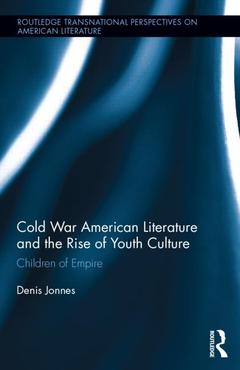Description
Cold War American Literature and the Rise of Youth Culture
Children of Empire
Routledge Transnational Perspectives on American Literature Series
Author: Jonnes Denis
Language: English
Keywords
Cold War; adolescents; post-war; parent; Arthur Miller; William Styron; J; D; Salinger; Tennessee Williams; Vladimir Nabokov; Jack Kerouac; Flannery O’Connor; Sylvia Plath; youth culture; cultural studies; American studies; twentieth-century American literature; age studies; Freud; Post-Freudian; The Catcher in the Rye; Lie Down in Darkness; Lolita; Oedipus Eddy; the Sixties; Young Man; NSA’s Spying; Anorexia Nervosa; Tennessee Williams’s Cat; Good Life; National Defense Research Committee; David Savran; Nullifi Cation; Leerom Medovoi; Early Cold War Years; Early Cold War Era; Secretary Of State; Early Cold War; Cold War America; Student Non-Violent Coordinating Committee; Adolf Hitler; Enduring Chill; Hot Tin Roof; Son’s Grief; Hal Chase; Juvenile Delinquency; Big Daddy; Charlotte Haze; Theater Essays; Whit Field
Approximative price 178.41 €
In Print (Delivery period: 14 days).
Add to cartPublication date: 10-2014
Support: Print on demand
Approximative price 58.78 €
In Print (Delivery period: 14 days).
Add to cartPublication date: 02-2018
· 15.2x22.9 cm · Paperback
Description
/li>Contents
/li>Readership
/li>Biography
/li>
Demands placed on many young Americans as a result of the Cold War give rise to an increasingly age-segregated society. This separation allowed adolescents and young adults to begin to formulate an identity distinct from previous generations, and was a significant factor in their widespread rejection of contemporary American society.
This study traces the emergence of a distinctive post-war family dynamic between parent and adolescent or already adult child. In-depth readings of individual writers such as, Arthur Miller, William Styron, J. D. Salinger, Tennessee Williams, Vladimir Nabokov, Jack Kerouac, Flannery O?Connor and Sylvia Plath, situate their work in relation to the Cold War and suggest how the figuring of adolescents and young people reflected and contributed to an empowerment of American youth. This book is a superb research tool for any student or academic with an interest in youth culture, cultural studies, American studies, cold war studies, twentieth-century American literature, history of the family, and age studies.
Introduction—"An Unprecedented Recession from Adult Life" Chapter 1. "Don’t Step on my Blue Suede Shoes"—Empire, Deterrence and the Origins of Dissent in Cold War America Chapter 2. Generational Politics, Fifties Freud and "the Fragmentation of the Oedipus" Chapter 3. The Parent-Apparent: The Post-Freudians, ‘De-Parentification,’ and the Cold War Family Paradigm Chapter 4. Generation on Trial: Arthur Miller’s Theater of Judgment Chapter 5. Trauma, Mourning and Self-(Re)fashioning: J. D. Salinger’s The Catcher in the Rye and the Reinvention of Youth in Cold War America Chapter 6. "Racing with the Moon": Hiroshima, Nagasaki and the All-American Girl in Styron’s Lie Down in Darkness Chapter 7. The End of Adulthood: Nabokov’s Lolita Chapter 8. Jack Kerouac: ‘"Oedipus Eddy" and "the Story of America" Chapter 9. Death’s Child: Lost Fathers, Bereaved Daughters, and the Rise of Postwar Feminism—Re-reading Sylvia Plath Chapter 10. The Comforts of Home: Generational Dialectics in Flannery O’Connor’s Fiction Conclusion: The Cold War, Vietnam, the Sixties and After
Denis Jonnes is Professor in the Anglo-American Studies Department at the University of Kitakyushu, Japan.




